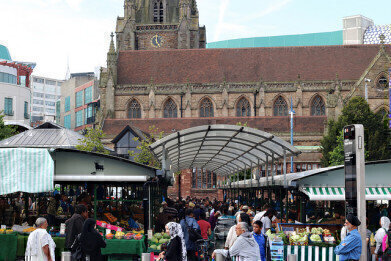Air Clean Up
Do UK Cities Have Unbreathable Air?
Nov 21 2017
When contrasted against the images we see on TV of Chinese citizens wearing face masks as they go about their daily business, it might seem like the UK’s air is positively wholesome. However, a new report from a conglomerate of environmental experts and bodies has found that 86% of the cities surveyed in the UK suffer from unsafe levels of pollution.
Published in medical journal The Lancet, the report analysed concentrations of the harmful pollutant particulate matter 2.5 in 51 cities around the UK. Worryingly, it found that 44 of those cities suffered from dangerous concentrations of the contaminant, as defined by the World Health Organisation (WHO).
A nationwide problem
The WHO recommends that in order to avoid the ill-effects of air pollution, people should not be exposed to concentrations of PM2.5 higher than 10mg/m3. While the EU’s legal limits of the same contaminant are a little higher, London has regularly fallen afoul of even that threshold, resulting in multiple court cases between the UK government and environmental law firm, ClientEarth.
But while London might steal all the headlines, it’s far from the only British metropolis which suffers from dangerously poor air quality. Somewhat surprisingly, the seaside centres of Southampton and Eastbourne were both similarly contaminated with the same level of 15mg/m3, as was Leeds. Birmingham, Cardiff and Oxford were not far behind (14mg/m3), while Manchester suffers from 13mg/m3.
However, none of those claimed top spot as the most polluted city in the UK in terms of PM2.5 concentration. That dubious accolade went north of the border, as Glasgow was found to have 16mg/m3 in its city centre.
Environmental, economic and human costs
These spiralling levels of contamination (worldwide exposure to PM2.5 has risen by 11.2% since 1990) not only spell bad news for our planet in environmental terms, but also carry a grave risk for human health and economy.
Every year, it’s thought that air pollution is responsible for up to 40,000 premature deaths across the UK, with as many as 9,000 of those occurring in the capital alone. As well as having an avoidable impact on human life, it also has serious consequences for the economy.
An estimated £22.6 billion is spent on mediating the health effects of air pollution exposure in the UK every year, while London's pollution has had a marked effect on property prices in the capital.
Acting today to safeguard tomorrow
The report also found that 802 schools in London alone were situated in areas with unsafe levels of air quality, meaning that young, vulnerable lungs could be compromised. Already, Mayor Sadiq Khan has proposed bringing forward the implementation of ultra-low emissions zones (ULEZs) and introducing a raft of other measures to improve air quality and reduce transport-related pollution.
Some of the suggestions tabled include phasing out speed bumps, increasing incentives for electric vehicles and redesigning roadways to smooth traffic flow, but some commentators think those proposals don’t go far enough. Dr Penny Woods, who is CEO at the British Lung Foundation, wants the government to come up with an entirely new Clean Air Act.
“This study reveals the tragic reality that the most polluted areas are exactly where our most vulnerable are - schools, hospitals and clinics,” she said. “The extent of the public health emergency we are facing demands nothing less than urgent action to protect our lung health.”
Events
May 05 2024 Seville, Spain
May 13 2024 Munich, Germany
May 23 2024 Beijing, China
May 23 2024 Beijing, China
Jun 10 2024 Algiers, Algeria














